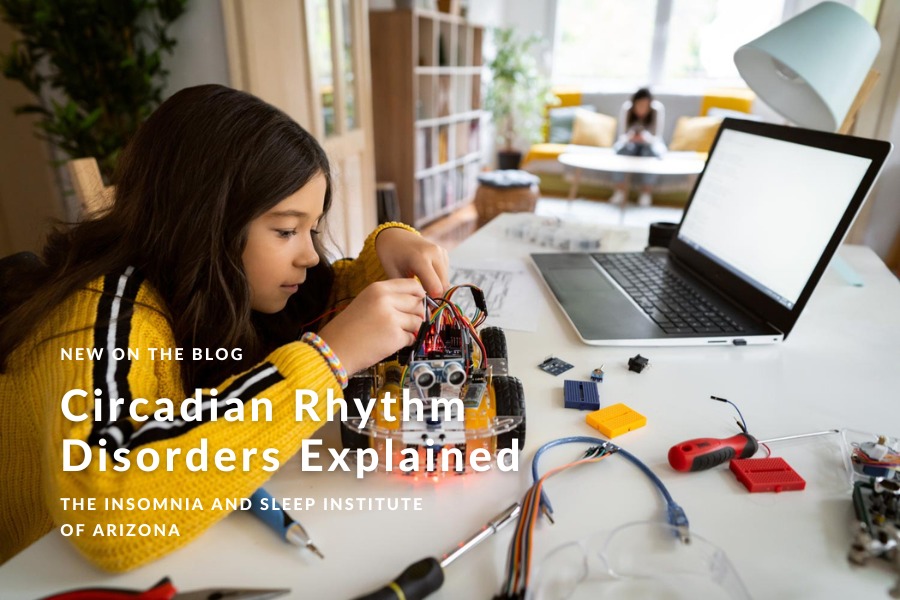There are many types of circadian rhythm disorders, which are also known as sleep-wake cycle disorders. They are also some of the many sleep disorders treated at The Insomnia and Sleep Institute of Arizona. These disorders happen when your body’s internal clock isn’t in sync with the environment. Your internal clock is your circadian clock, and it’s on a roughly 24-hour cycle. This repetitive 24-hour cycle is known as the “circadian rhythm.” Your body tries its best to sync up your sleep-wake cycle with your surroundings, which is why you wake up when it’s daybreak and get sleepy at night. It also aligns with when you are most active and when you eat. However, for those whose sleep-wake cycle isn’t aligned with the environment, you can struggle to sleep when you’re supposed to or get quality sleep. When your sleep-wake cycle is disrupted to a degree in which your daily activities struggle, you may have a circadian rhythm disorder.
Sometimes these disruptions are temporary, such as when traveling through time zones. Other times, it’s a chronic condition and may be caused by genetics, age, or another condition. Symptoms include daytime sleepiness, issues with memory, and minimized alertness. Diagnosis typically requires discussing sleep habits and diagnostic testing. Knowing what type of circadian rhythm disorder you have will inform treatment. However, if you don’t have a circadian rhythm disorder yet, you can help prevent one from forming by making healthy lifestyle and sleep habit changes. Circadian rhythm disorders that go untreated can lead to accidents and co-morbidities.
Types of Circadian Rhythm Disorders
Advanced sleep-wake phase disorder presents as finding it tough to stay awake early in the evening. This can result in waking up too early in the morning. In many cases, this can get in the way of work, school, and your personal life. Of course, there are some lifestyles that complement this disorder. There is also delayed sleep-wake phase disorder, which is one of the most common. With this disorder, patients fall asleep later than they would prefer, which results in making it difficult to wake up in the morning. This is much more likely to interfere with your life because of the inherent “structure” of the Western work schedule.
There’s also irregular sleep-wake rhythm disorder, which means a person has many short periods of wakefulness and sleep. You might find it a challenge to sleep at night and make up for it by taking mini naps during the day. Of course, this will culminate in not feeling well rested and excessive sleepiness. The non-24-hour sleep-wake rhythm disorder happens when you’re just not in sync with the 24-hour day. Your sleep times might slowly delay and you might find yourself wanting to sleep at noon. When light exposure is limited, this is most likely to occur. Those who are blind have a high propensity to this disorder. Patients may experience bouts of insomnia as well as periods of no symptoms because their cycle just happens to align (for the moment) with the proper 24-hour cycle.
Environmental Inductions
“Jet lag disorder” is a real disorder, even though it’s a common one that most people have experienced. When you travel over at least two time zones in a short period, it’s likely to occur. Your body will take time to adjust to the new time zone and schedule. Typically, jet lag does not need treatment though you may want to use OTC sleep aids for a couple of days to help readjust to the new time zone.
Shift work disorder may be more difficult to manage. This happens to those who work the night shift. Night shifts can cause insomnia along with all of its symptoms and, eventually, co-morbidities. If the night shift is causing you sleep disorders, getting help from a sleep expert is a must. It’s not always possible to change your work schedule, so professional intervention and support will be necessary.
The kind of circadian rhythm disorder you have will dictate your treatment. Options like sleep hygiene best practices, medications, and cognitive behavior therapy for insomnia are some of the most common approaches. Contact The Insomnia and Sleep Institute today to schedule a consult with a sleep expert who can diagnose disorders. Call us during business hours or, for the quickest response, complete the online contact form now.





